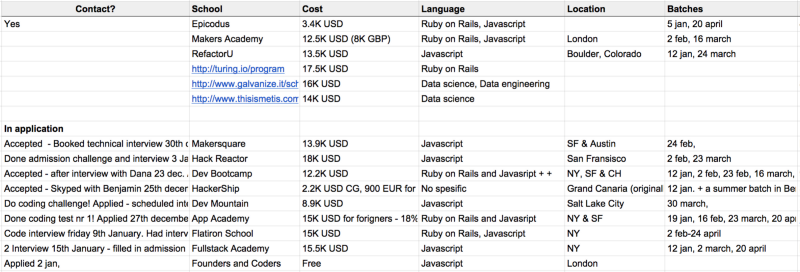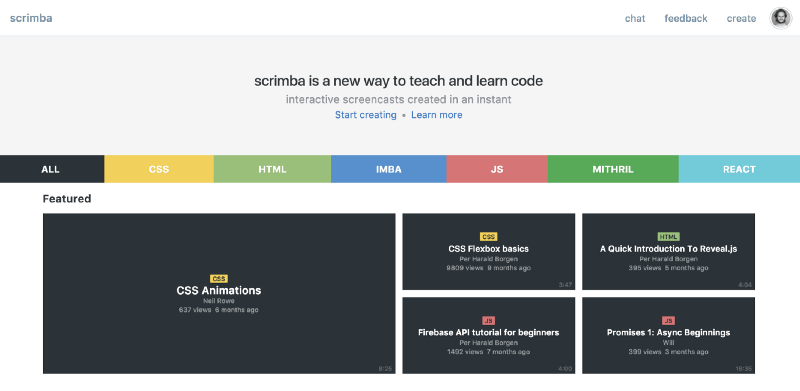By Per Harald Borgen
In 2015 I was totally non-technical. And yet, five months later, I got hired as a developer. This was all thanks to a fantastic (and free) coding bootcamp in London. It was the best learning experience I’ve ever had, and one that I’ve written a lot about.
I’m now building a coding screencast tool that makes it easier to teach and learn programming, so I care a lot about this subject. I love to hear stories of people who have changed their lives through learning how to code.
But not everyone who attends a coding bootcamp succeeds to get a good job. This isn’t surprising since there are so many pitfalls to avoid along the way.
This article will help you to avoid these pitfalls and come out as an professional developer.
Tip #1: Pick the right one
You should think closely about which coding bootcamp you choose. There are many of them, and what separates them isn’t only their quality, but a bunch of other verticals as well.
Here are a few:
- Cost: ranges from free (or free upfront, but you pay a percentage of your first year’s salary) on up to US $20,000
- Location: should you move to a different city or finding a local coding bootcamp?
- Tools taught: JavaScript/Node.js, Python, Ruby, .NET, etc.
- Online vs. offline
Consider each of these factors and figure out what’s important for you and what’s not. Once you know what you want (such as a JavaScript bootcamp for under $15, 000 USD in the US this autumn) you can start searching for the right one.
You should be methodical about this. If you need tips on exactly how to do this, I’ve written an article about how I did it here.
In essence, I made a big list of the ones that were relevant for me, then applied to all of them. Then I filtered down as I either got rejected or decided to reject them.
I was accepted to five different ones, meaning I could pick and choose. After a lot of consideration, I went for Founders and Coders in London.
One of the most important aspects of this process is filtering out the less serious schools. You don’t want to end up at a school which cares more about making money than creating good software developers.
Tip #2: Prepare like hell.
You will only have a few months to build up your skills. So you should do yourself a favor and prepare like hell beforehand.
Once I decided to do a bootcamp, I ramped up my coding activity from hobby to obsessive hobby. I spent all my free time doing algorithm challenges, building small games and going through tutorials.
Do this and it’ll make your first week or two slightly easier.
The reason this is so important is because the first few weeks are the toughest. The amount of information you have to digest this period is staggering. Almost everything will be new to you.
Not only do you have to learn new programming concepts every day, but all the tooling and lingo. Even the people around you will be new to you.
If you aren’t prepared, you might start lagging behind. In my experience, those lagging behind in the beginning are also lagging behind in the end. You should avoid this at any given cost.
Tip #3: It’s not a full time job — it’s even more work than that
This advice feels a bit silly to write here. But I still think I have to, because I know from personal experience that not everybody follows it.
That’s why many of them have classes and projects that span outside of the traditional nine-to-five workday.
Your chance of successfully getting a job is positively correlated with the time you spend.
Some students treat a bootcamp as a regular job or school, and skip coding in the evenings or on weekends. While some people can pull this off, it’s likely to not work out well for you.
I moved from Oslo to London to do Founders and Coders. This meant I had no friends in town except the ones I met at the bootcamp. This worked great, as I could spend all my time thinking about code. I loved it.
Tip #4: Make sure you specialize
Finally, you shouldn’t spread your efforts equally throughout all subjects. You should start specializing at some point.
This might seem counter-intuitive, because you have so many holes in your knowledge that you’ll need to fill. It might seem smart to focusing on covering the basics of all subjects.
But you’re going to graduate with a lot of holes in your knowledge anyway, so a few more doesn’t make much difference. But if you’ve specialized in one subject, this might make the difference between impressing at least one interviewer and not impressing any interviewers. At least, that’s what happened to me.
This strategy was exactly what got me a job after my bootcamp.
Midway through the bootcamp, I chose to focus on React.js. I enjoyed working with the library. This didn’t mean I could spend all my time coding React from there on. I still had to learn all the other stuff that was in the syllabus. But I included the library whenever it was possible, and gravitated towards the tasks that included React. This allowed me to have five React projects in my portfolio instead of only a couple.
And that’s about it
If you follow these tips you’re likely to get a job as a junior software developer after your bootcamp. And when you do, make sure you read my survival guide for junior developers.
Thanks for reading! I’m Per, co-founder of Scrimba, a tool for creating interactive code screencasts. Be sure to check it out if you’re either teaching or learning how to code.


